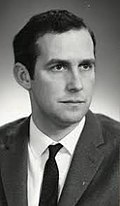1980 Denison state by-election
 From Wikipedia - Reading time: 5 min
From Wikipedia - Reading time: 5 min
| |||||||||||||||||||||||||||||||||||||||||
All 7 seats for the Division of Denison in the House of Assembly 4 seats needed for a majority | |||||||||||||||||||||||||||||||||||||||||
|---|---|---|---|---|---|---|---|---|---|---|---|---|---|---|---|---|---|---|---|---|---|---|---|---|---|---|---|---|---|---|---|---|---|---|---|---|---|---|---|---|---|
| |||||||||||||||||||||||||||||||||||||||||
A by-election for the Tasmanian House of Assembly was held in the Division of Denison in the Australian state of Tasmania on Saturday 16 February 1980.
Background
[edit]The election was the first to use the Robson Rotation, a method of rotating names on ballot papers.[1] In previous elections, candidates were listed in alphabetical order by surname.
By-elections are not usually held in the Tasmanian House of Assembly because casual vacancies are filled by a countback of votes, a system that has been in place since 1917.[2]
On 18 December 1979 the Supreme Court of Tasmania ordered that the election of three candidates in the 1979 election be declared void.[3] The court found that Julian Amos, John Devine and John Green had exceeded their spending limits.[3][4] As a result, all elected members for the electorate of Denison were required to face another election.
Elected Members
[edit]The election resulted in two previously elected members losing their seats: John Green from the Labor Party and Bob Baker from the Liberal Party. Elected in their place were Norm Sanders from the Democrats and Liberal Gabriel Haros.
The following candidates were elected, listed in order of election:
| Order | Name | Party |
|---|---|---|
| 1 | Neil Batt | Labor |
| 2 | Max Bingham | Liberal |
| 3 | Gabriel Haros | Liberal |
| 4 | Julian Amos | Labor |
| 5 | John Devine | Labor |
| 6 | Robert Mather | Liberal |
| 7 | Norm Sanders | Democrats |
Result
[edit]| Party | Candidate | Votes | % | ±% | |
|---|---|---|---|---|---|
| Quota | 5,819 | ||||
| Labor | Neil Batt (elected 1) | 8,272 | 17.8 | +5.2 | |
| Labor | John Devine (elected 5) | 4,346 | 9.3 | −2.4 | |
| Labor | Julian Amos (elected 4) | 3,928 | 8.4 | −3.6 | |
| Labor | John Green | 2,325 | 5.0 | −2.8 | |
| Labor | Bob Graham | 2,108 | 4.5 | −0.6 | |
| Labor | Stan Joiner | 332 | 0.7 | +0.7 | |
| Labor | Norm Hanscombe | 304 | 0.7 | +0.3 | |
| Liberal | Max Bingham (elected 2) | 5,960 | 12.8 | −12.9 | |
| Liberal | Gabriel Haros (elected 3) | 5,658 | 12.2 | +7.4 | |
| Liberal | Robert Mather (elected 6) | 2,160 | 4.6 | +0.8 | |
| Liberal | Geoff Davis | 1,616 | 3.5 | +0.5 | |
| Liberal | Bob Baker | 1,540 | 3.3 | +1.6 | |
| Liberal | Max Robinson | 1,364 | 2.9 | +1.5 | |
| Liberal | Doug Clark | 1,194 | 2.6 | +2.6 | |
| Liberal | Terry Bower | 462 | 1.0 | +0.5 | |
| Liberal | Alan Hughes | 355 | 0.8 | +0.8 | |
| Democrats | Norm Sanders (elected 7) | 2,798 | 6.0 | +1.8 | |
| Democrats | Peter Brown | 466 | 1.0 | +1.0 | |
| Democrats | Rod Broadby | 422 | 0.9 | −1.9 | |
| Democrats | Elizabeth Holloway | 206 | 0.4 | +0.4 | |
| Democrats | Andrew Langlinger | 149 | 0.3 | +0.3 | |
| Democrats | John Harrison | 130 | 0.3 | +0.3 | |
| Democrats | Bruce Kent | 121 | 0.3 | +0.3 | |
| Christian Democrats | Hellen Kelly | 168 | 0.4 | +0.4 | |
| Christian Democrats | Stephen Shelley | 167 | 0.4 | +0.4 | |
| Total formal votes | 46,551 | 94.8 | −1.5 | ||
| Informal votes | 2,538 | 5.2 | +1.5 | ||
| Turnout | 49,089 | 90.0 | −2.4 | ||
| Party total votes | |||||
| Labor | 21,615 | 46.4 | -4.3 | ||
| Liberal | 20,309 | 43.6 | +1.6 | ||
| Democrats | 4,292 | 9.2 | +1.8 | ||
| Christian Democrats | 335 | 0.7 | +0.7 | ||
References
[edit]- ^ Newsletter of the Proportional Representation Society of Australia Archived 2011-07-06 at the Wayback Machine, Number 69, March 1993
- ^ House of Assembly Elections, Tasmanian Parliamentary Library
- ^ a b Report on Parliamentary Elections 1978 to 1980 Archived 2007-08-30 at the Wayback Machine, Parliament of Tasmania, 1980.
- ^ A Tasmanian Political Almanac, Parliament of Tasmania
- ^ "1980 Results in Denison for the By-Election held on 16 February 1980". Tasmanian Parliamentary Library.
Further reading
[edit]- Denison form guide 2006 Archived 2008-07-17 at the Wayback Machine, Poll Bludger, 2006. Quoting an article by Wayne Crawford of The Mercury in 2002.
 KSF
KSF
